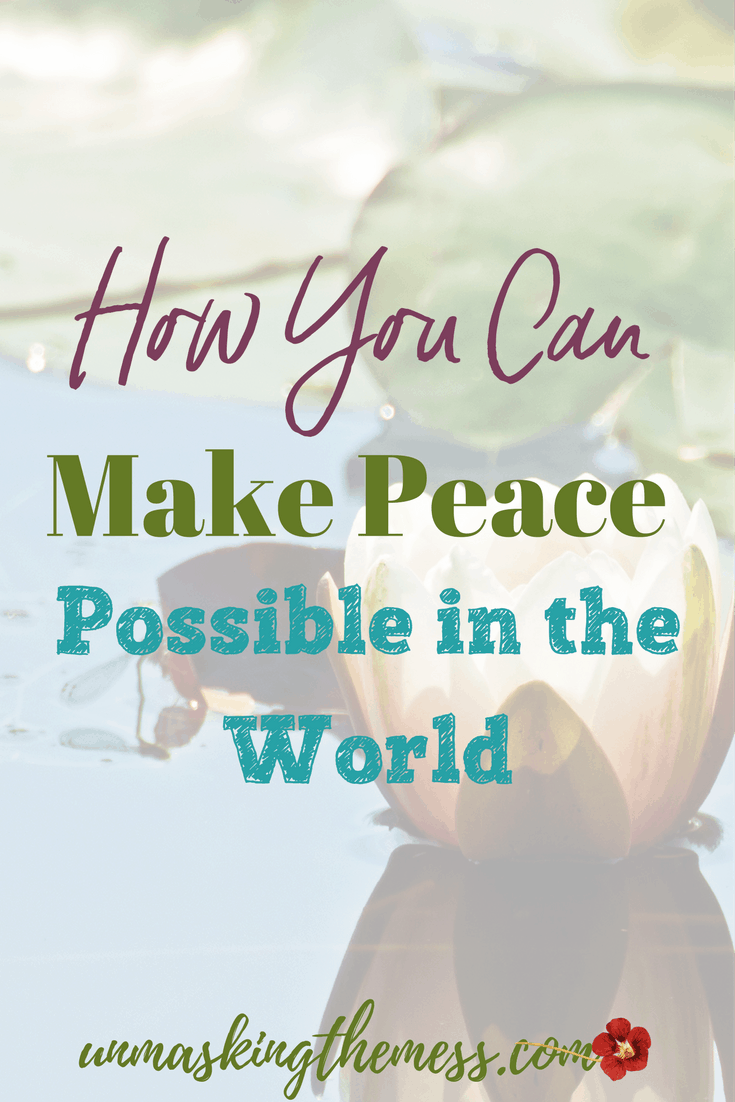The Bahá’í teachings present a comprehensive framework for the attainment of world peace, advocating principles that transcend mere idealism. They encourage individuals to actively participate in the cultivation of unity and harmony within their communities and beyond. The very foundation of the Bahá’í Faith rests upon the profound aspiration for global harmony, positing that the eradication of prejudice and the promotion of justice are quintessential elements in this quest. This article elucidates the multifaceted ways in which an individual can contribute to making world peace possible, anchored in the rich teachings of the Bahá’í Faith.
At the heart of the Bahá’í principles lies the conviction that humanity is fundamentally one. This assertion fosters a sense of interconnectedness that transcends geographical, cultural, and religious boundaries. Recognizing this unity transforms the way we perceive ourselves and others. To help make world peace possible, it is paramount to cultivate an unwavering belief in the oneness of humanity. This can be achieved through personal reflection, education, and dialogue with individuals from diverse backgrounds. By fostering empathy and understanding, one can dismantle barriers that often lead to conflict and division.
The second pivotal Bahá’í principle to consider is the importance of justice. Justice is not merely an abstract concept; it is a fundamental requirement for social stability and coherence. A Bahá’í adheres to the principle of justice by advocating for fairness and equity in all interactions. This commitment manifests in various forms, such as engaging in community service, defending the rights of the marginalized, and standing up against discrimination. Serving as a paragon of justice within one’s community establishes a ripple effect, encouraging others to pursue similar endeavors.
Moreover, the role of consultation in the Bahá’í Faith serves as a crucial mechanism for conflict resolution and community building. Consultation is characterized by mutual respect and a spirit of openness, allowing individuals to share their perspectives without fear of judgment. This practice cultivates a sense of belonging and encourages collective problem-solving. Implementing consultation in personal and communal spheres not only bridges gaps in understanding but also fosters a culture of collaboration. In an increasingly divisive world, promoting a consultative spirit can transform discord into dialogue, enhancing prospects for peace.
Furthermore, the Bahá’í teachings emphasize the vital role of education in fostering peace. Recognizing education as a powerful tool for personal and social transformation, a Bahá’í is encouraged to pursue lifelong learning and to support educational initiatives in various forms. By advocating for universal access to education, particularly for marginalized groups, one actively contributes to the dismantling of structural inequalities that often incubate conflict. Inclusive education, which embraces diversity and promotes critical thinking, can empower individuals to emerge as informed and compassionate members of society.
Additionally, the teachings of Bahá’u’lláh underscore the imperative of economic justice. By addressing the profound disparities that exist within and between societies, efforts can be directed toward creating equitable conditions for all. Advocating for policies that ensure economic opportunities and equitable resource distribution is paramount. Engaging in local initiatives that promote sustainable development and ethical business practices is one practical avenue to embody these teachings. Economic empowerment can ultimately reduce tensions rooted in poverty and inequality, thereby laying groundwork for lasting peace.
Another critical dimension of the Bahá’í approach to world peace revolves around spirituality. Spiritual principles provide the moral compass that guides interactions and fosters a sense of purpose. Engaging in collective prayer and reflection not only strengthens personal faith but also unifies communities under a shared vision of peace. Spirituality connects us to our higher selves, cultivating qualities such as love, compassion, and resilience. These attributes are indispensable when navigating conflicts and challenges at both personal and communal levels. As individuals deepen their spiritual understanding, they become exemplars of the virtues that enhance communal harmony.
Furthermore, the Bahá’í teachings espouse the significance of the advancement of women as a catalyst for peace. Gender equality is not merely a women’s issue but a foundational step towards social equity. Empowering women unlocks their potential to contribute to societal well-being and fosters a more just and peaceful environment. Engaging in advocacy for women’s rights and representation in decision-making processes is an essential undertaking. A society that honors the contributions of women is more likely to cultivate inclusivity and curb violence.
Lastly, the Bahá’í commitment to global cooperation serves as an essential pillar in the struggle for peace. Encouraging engagement with international bodies and supporting initiatives aimed at fostering global solidarity reflects a commitment to collective well-being. Whether through participating in social action campaigns, volunteering for non-profit organizations, or simply raising awareness about global issues, each action contributes to a broader movement towards peace. By building bridges between cultures and nations, we can cultivate a sense of global citizenship that transcends parochial interests.
In summary, the Bahá’í teachings provide a robust framework for making world peace possible. By cultivating unity, advocating for justice, promoting education, and embracing spiritual principles, an individual can actively contribute to the creation of a harmonious society. Each action, grounded in the tenets of the Bahá’í Faith, is a step toward actualizing the vision of a peaceful world. It is through collective efforts and a steadfast commitment to these principles that humanity can navigate the complexities of coexistence and work toward a more equitable and tranquil future.
